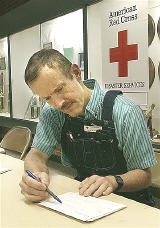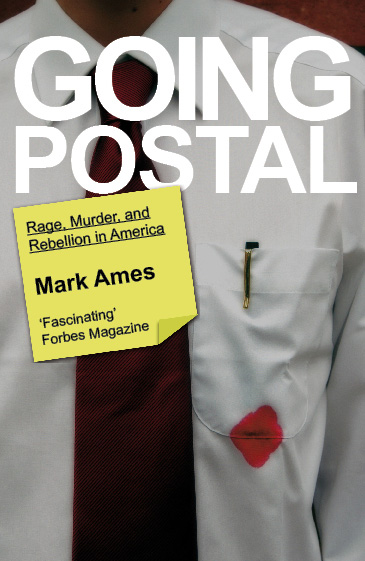It is clear by now that Bruce Ivins did indeed send those anthrax spores. The most damning evidence, in the view of the bovine chorus, is the fact that he wrote poetry. A sample of the poetical works of the late Doctor Ivins has now made its way onto the internet. Let us consider it carefully—gloves and full NBC suit recommended but not required. Here is Ivins’s brief excursion up the slopes of Parnassus:
I’m a little dream-self, short and stout.
I’m the other half of Bruce — when he lets me out.
When I get all steamed up, I don’t pout.
I push Bruce aside, then I’m Free to run about!
We note that Ivins, a conservative to the end, has chosen to work his magic on a venerable folk-verse, the quatrain beginning “I’m a little tea-pot, short and stout….” Close readers may have noted that Ivins has, in a startling departure, replaced “teapot” with “dream-self.” One might be tempted to quibble with the substitution on several grounds. First, while a teapot is literally, inevitably, “short and stout,” why must Ivins handicap his persona with a weight problem and the sort of psychological problems so often associated with modest height?
Worse yet, one cannot help suspecting that Ivins does not even really feel any poetic commitment to this characterization of the persona, and that he merely appended “short and stout” to the line because he had no new adjectives to bestow. What goes for the teapot, dear Mr. Ivins, doth not always go for the dream-self.
But one must concede that Ivins has, at least, admirably retained the prosody of the model; “dream-self” has the simple double stress of “teapot,” despite the slight orthographical mismatch arising from the assimilation of what was once a hyphen in the writing of the older, homelier word.
This cannot be said, alas, for Ivins’s second line:
“I’m the other half of Bruce—when he lets me out.”
Compare Ivins’s variant with the original, “This is my handle and this is my spout,” and you see the loss of force, of momentum. The twin phrases beginning “this” drive the reader onward, confronting him or her with the stark facts, “handle,” and “spout.” Ivins’s line, with its awkward caesura, has no such force or cohesion. The first phrase, “I’m the other half of Bruce” is wordy, and inadvisably reminds the reader of the poet’s risible given name, replacing the intended menace with mere buffoonery. The predicate, dramatically offset with a Dickinson-like dash, is something of an anticlimax. The perspicacious reader, encountering the work of a suicide who overdosed rather than face trial for the poisoning of 17 total strangers, is well aware that “Bruce” has another “half,” less engaging than the suburban juggler and writers of letters to the editor familiar to Ivins’s friends and family. One feels the poet is belaboring the obvious here.

Poet at work: Ivins double-checks his rhymes.
The latter couplet confirms all one’s worst fears for the poem: good humor is replaced with amateurish menaces, vague and disappointing:
When I get all steamed up, I don’t pout.
I push Bruce aside, then I’m free to run about.
What we see in this regrettable dimuendo is the consequence of generations of poetry-as-therapy, with relentless focus on “I, I, I” and no respect for prosody. “When I get all steamed up” shows the same overloading of the first phrase which seems to be Ivins’s besetting sin (other than poisoning). The final phrase, “…then I’m free to run about,” is among the weakest in the poem, crippled by the poet’s unwillingness to come to grips with the specifics of his case. The old adage, “Write what you know,” would have helped here. If only Ivins had had the sense to use the details of his murder plot to add to the humor of the piece, instead of settling for the vapid periphrasis “…run about.” Ivins, give him his due, did a great deal more than “run about” when his metabolically-challenged doppelganger was at the controls. One would have liked to see this activity acknowledged.

Anthrax: Second from left, top row
Most of all one feels the grief of what might have been. Consider the missing word here, the obvious payoff to a short light verse of this sort: “Anthrax.” What a closer that word might have given to the poem! Granted, rhymes for “anthrax” are not numerous, but what about the one I am sure my readers will be eagerly shouting at their monitors? I refer, of course, to “spice racks.” What better rhyme for a harmless-looking white powder capable of wiping out half of Manhattan? Ivins could have closed with something on those lines, something that offered a good belly laugh, for instance—this is simply an impromptu, very rough draft, of course:
Then to save what’s left of my sweet Anthrax,
I hide the white powder in my wife’s spice racks!
Note the humorous “punch” supplied by the complex assonance and consonance in the twinned phrases “white powder” and “wife’s spice.” Further whimsy is provided by the reader’s delighted anticipation of the fun which must ensue the next time Mrs. Ivins attempts to dust her cakes with that innocuous-looking powder! After all, the notion that great poetry must always embrace high seriousness and eschew levity is no more than a middlebrow myth, vide Byron and Stevens.
In conclusion, Ivins’s opus posthumous is a sad reminder of the lesson so many would-be poets of the past century have failed to learn: invaluable though it may be, criminal insanity is not enough.
Further Reading:
Separated At Mom Always Liked You Best But I Can Fix That
Read more: anthrax, Ivins, poetry, John Dolan, Fatwah


Got something to say to us? Then send us a letter.
Want us to stick around? Donate to The eXiled.
Twitter twerps can follow us at twitter.com/exiledonline















